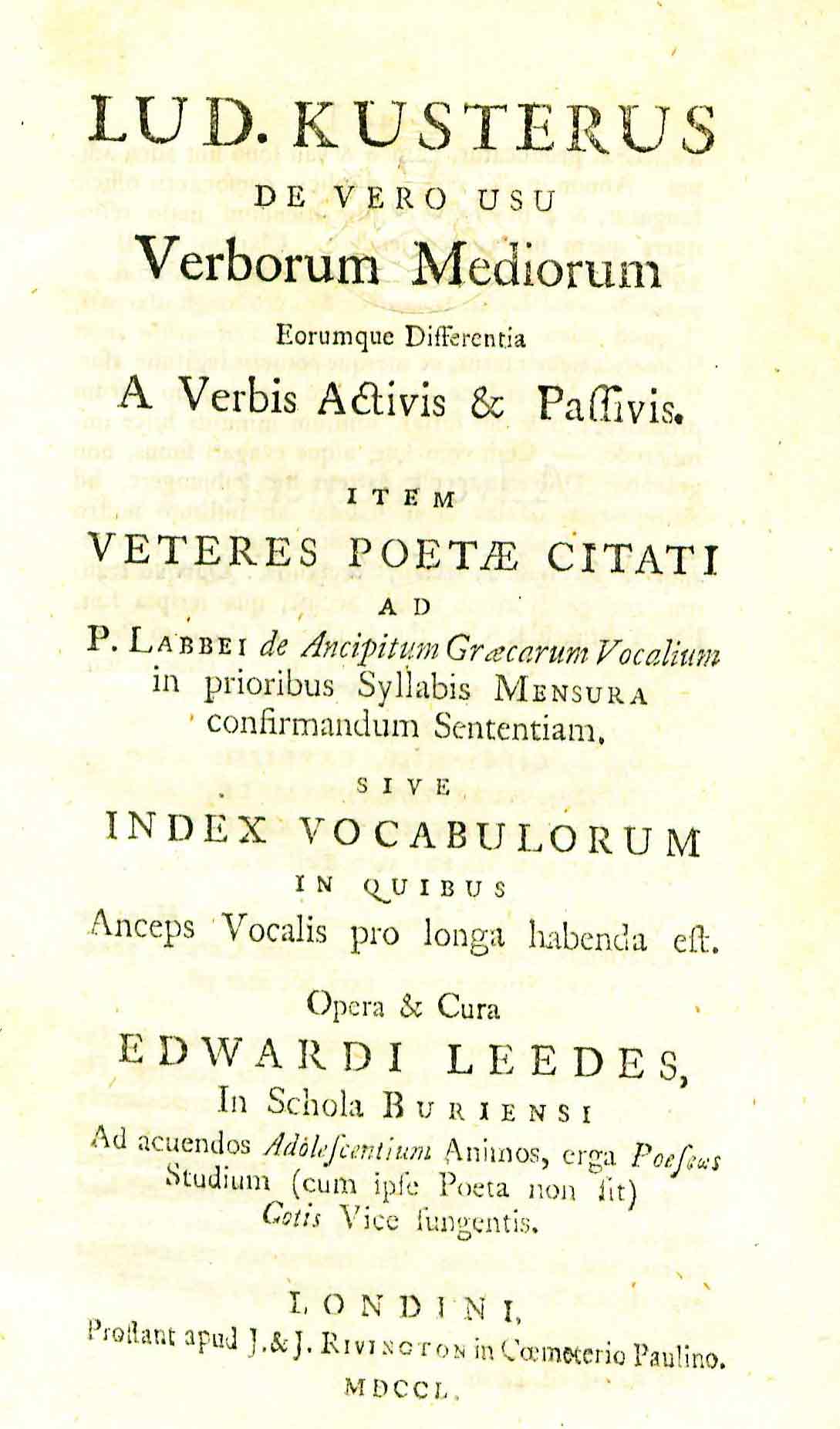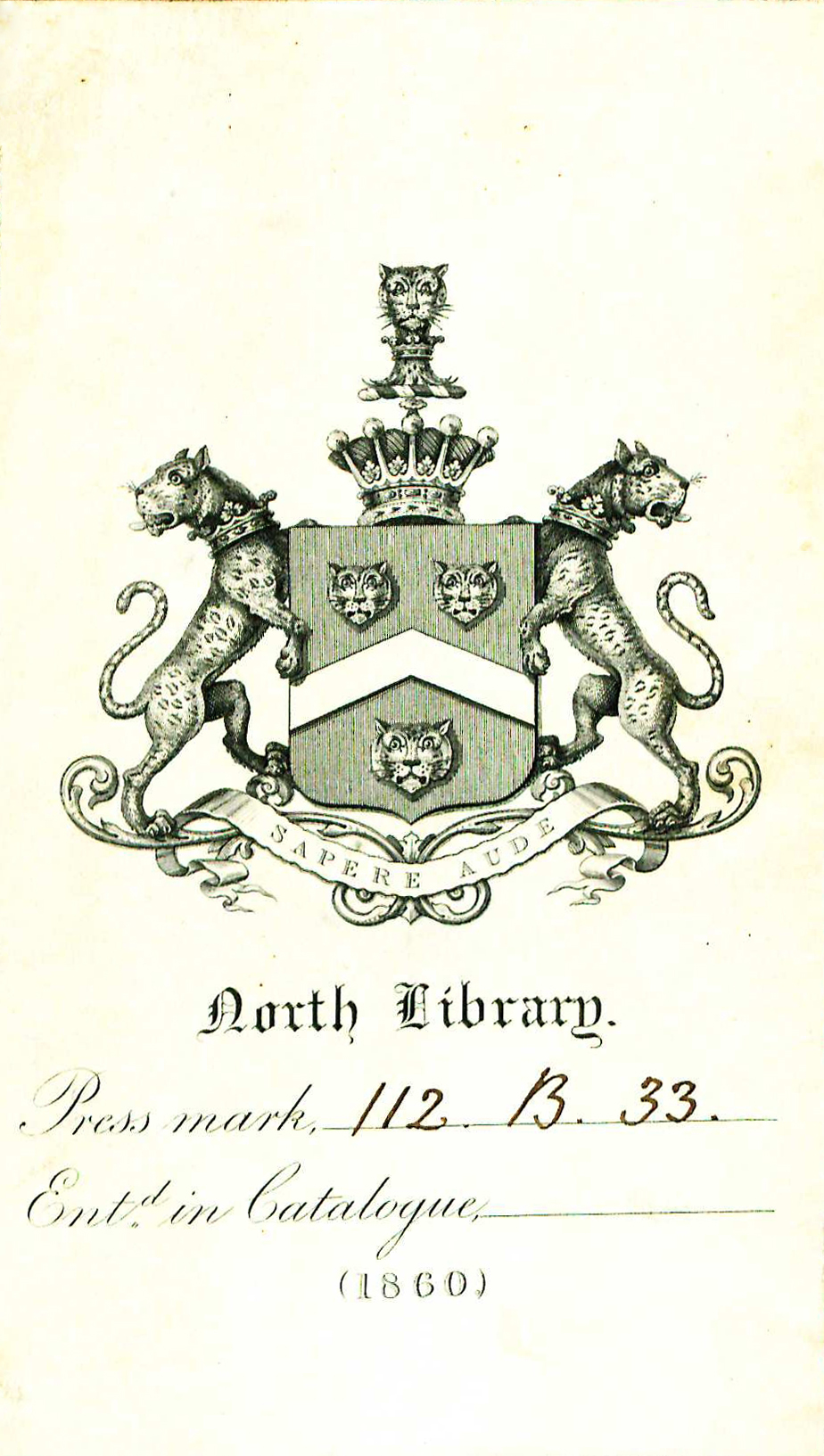Lud. Kusterus de Vero Usu Verborum Mediorum Eorumque Differentia a Verbis Activis & Passivis.: Item Veteres Poetæ Citati
by Ludolf Kuster
| Lud. Kusterus De Vero Usu Verborum Mediorum | |
|
Title page from Lud. Kusterus De Vero Usu Verborum Mediorum Eorumque Differentia a Verbis Activis & Passivis, George Wythe Collection, Wolf Law Library, College of William & Mary. | |
| Author | Ludolf Küster |
| Editor | Edward Leedes |
| Published | Londini: Prostant apud J. & J. Rivington ... |
| Date | 1750 |
| Language | Latin |
| Pages | viii, vii, 8-148 |
| Desc. | 12mo (17 cm.) |
| Location | Shelf I-1 |
Ludolf Küster (1679 – 1716) was born in Blomberg in Westphalia.[1] Educated in Germany, and for a short time professor in Berlin, he lived most of his life in Holland.[2]
Küster, a classical scholar and critic, published the journal Bibliotheca Librorum Novorum under the pseudonym "Neocorus" from 1697 to 1699.[3] By 1699, he "was already considered one of the most eminent Hellenists of his day."[4] While living for a brief time in England, Küster edited Suidas's lexicon and published it in 1705 at Cambridge.[5] In 1716 he "is said to have died of an ailment brought on by sitting constantly doubled up writing at a low table with three or four circles of books around him.”[6]
Küster wrote Lud. Kusterus De Vero Usu Verborum Mediorum in Latin on the true use of words by means of active and passive verbs. He cited ancient poets who agreed with his view that Greek vowels in the first syllable were dangerous. The title includes a note that the index is necessary to deal with difficult vowels in the long term.
Evidence for Inclusion in Wythe's Library
Thomas Jefferson sent Wythe a copy enclosed with a letter dated October 24, 1794, "I inclose for your perusal a little treatise by Kuster on the use of the middle voice in Greek. I never saw a copy of it till I met with this, nor had ever heard of it. I presume therefore it may be new to you; & if it gives you half the pleasure it did me, mine will be doubled still." George Wythe's Library[7] on LibraryThing includes the first edition (1750). The Brown Bibliography[8] suggests either the first edition or the tenth (1793). The Wolf Law Library purchased a copy of the first edition.
Wythe only had possession of the Küster for a week or so; he returned it to Jefferson on November 1, 1794, with a letter stating that he has time for nothing but court papers, and saying he would not "deprive you of a pleasure I am forbidden to enjoy."
Description of the Wolf Law Library's copy
Bound in contemporary calf. Includes the nineteenth-century armorial bookplate of the Earls of Macclesfield, Shirburn Castle, Oxfordshire, England on the front pastedown. Purchased from Christopher Edwards.
Images of the library's copy of this book are available on Flickr. View the record for this book in William & Mary's online catalog.
See also
References
- ↑ Leonard Forster, "Henry Sike of Bremen (1669-1712) Regius Professor of Hebrew and Fellow of Trinity," Transactions of the Cambridge Bibliographical Society 10, no. 3 (Cambridge: Cambridge Bibliographical Society, 1993): 264.
- ↑ David Murray, “Some Letters of Robert Foulis,” The Scottish Historical Review 14, no. 54 (Edinburgh: Edinburgh University Press, 1917): 108.
- ↑ Murray, "Some Letters of Robert Foulis," 108.
- ↑ Forster, "Henry Sike of Bremen," 264-65.
- ↑ Alexander Pope, Selected Poems; The Essay on Criticism; The Moral Essays; The Dunciad (London: Longmans, Green, and Co., 1888), 207.
- ↑ Murray, "Some Letters of Robert Foulis," 108
- ↑ LibraryThing, s.v. "Member: George Wythe," accessed on February 24, 2014.
- ↑ Bennie Brown, "The Library of George Wythe of Williamsburg and Richmond," (unpublished manuscript, May, 2012) Microsoft Word file. Earlier edition available at: https://digitalarchive.wm.edu/handle/10288/13433.

